PLATFORM FOR ADVANCED CLINICAL THERAPIES (PACT)
Driving advanced therapeutics from bench to bedside
The Platform for Advanced Clinical Therapies (PACT) strives to close the gap between cutting-edge advanced therapeutics — such as RNA, gene and cell therapies — and their clinical implementation, making it possible to treat patients with the most challenging neurological and rare diseases.
Part of the Clinical Research Unit at The Neuro (Montreal Neurological Institute-Hospital) — one of Canada’s largest neurological clinical trial centres — PACT collaborates with industry sponsors and academic investigators to design, start-up, recruit and manage complex clinical trials that require specialized facilities and staff expertise.
Contact Us

INDUSTRY-LEADING TRIAL SITE
Established 40 years ago, the Clinical Research Unit at The Neuro is one of the largest neurological clinical trials units in Canada.
OUR TRACK RECORD
- Collaborations with national and international companies and key opinion leaders
- Extensive experience in Phase I- IV trials, including dedicated Phase 1 Unit for first in-human intervention
- Competence as a site to execute complex and versatile trials, involving advanced therapeutics
- Access to The Neuro’s OR facilities, Neurocritical Care Unit (NCCU), and Interventional radiology expertise
- Part of Catalis Quebec’s Fast Track Approval program
- Currently establishing the environment for cell therapy trials
Experience with:
- ASO therapies for Amyotrophic Lateral Sclerosis (ALS), Prion Disease, Huntington’s Disease, Parkinson’s Disease, Progressive Supranuclear Palsy (PSP), Spinocerebellar Ataxia (SCA2), and Alzheimer’s Disease
- siRNA-antibody combination treatment for Myotonic Dystrophy Type 1 and FSHD
- Viral vector-based gene therapy to slow early-onset Frontotemporal Dementia
INVESTIGATOR-INITIATED TRIAL DESIGN
Extensive experience in the design, start up, regulatory submissions, implementation and management of clinical trials involving advanced therapeutic products.
WHAT WE OFFER
- Knowledge of the latest preclinical developments and innovations
- Expertise in clinical trial design for various patient populations – including Single Patient Clinical Trials (SPCTs)
- Design and management of clinical trials, including start-up and regulatory submissions as well as trial operations
- Collaborations with specialised units at The Neuro such as the McConnell Brain Imaging Centre (BIC), the Early Drug Discovery Unit (EDDU), and the Open Biobank (C–BIG)
Currently in start-up at the PACT:
First in-human ASO therapy for children with Schinzel-Giedion Syndrome (PI: Carl Ernst)

10 YEARS OF EXPERIENCE IN EARLY PHASE STUDIES

PHASE I UNIT
- 35 Phase I studies conducted
- 1st gene therapy trial in Canada for dementia
- Research nurses dedicated to the Unit with ICU/critical care training
- In-house lab team trained for Phase I trials
- Research pharmacy and clean room for advanced therapy products
- Facilities for overnight stays, access to ICU, ER
ACCESS TO LARGE NEUROLOGICAL PATIENT POPULATIONS


MANAGEMENT TEAM

ZIV GAN-OR, MD, PhD
Ziv Gan-Or’s lab works to identify targets for drug development in neurodegenerative disorders using genetic methods; understand how genetics affect disease risk, progression and response to medications; and how to apply genomics to improve clinical trials by targeting specific genetic subpopulations of patients. He works with numerous pharmaceutical companies and serves on several scientific advisory boards, to help facilitate precision medicine in PD treatment.
His work on the GBA1 gene in Parkinson’s disease (PD) helped advance the first ever phase 2 trial on a genetic subtype of PD. Other genes, that Dr. Gan-Or’s research identified as important in PD, including SMPD1, TMEM175, GALC, are currently being developed as therapeutic targets.
*Executive director, Clinical Research Unit, the Neuro
*Director, GBA1-Canada Program
*Lead, International REM-sleep Behavior Disorder Genomics Consortium
*Lead, Clinical Genetics and Gene Discovery team of the Canadian Consortium for Neurodegeneration in Aging (CCNA)
*Lead, Genetics Core of the North American Prodromal Synucleinopathy (NAPS) consortium

MASSIMO PANDOLFO, MD
Prior to coming to McGill, Dr. Massimo Pandolfo was Chief of Neurology at Erasme Hospital and Professor of Neurology at the Université Libre de Bruxelles (ULB), where he was also Director of the Laboratory of Experimental Neurology.
His research interests focus on neurogenetics. In 1996, an international collaboration led by Dr. Pandolfo was the first to identify the Friedreich’s ataxia (FRDA) gene.
He has since contributed to the study of the molecular pathogenesis of the disease, to the development of therapeutics, and to its clinical characterization. He has been the coordinator of EFACTS (European Friedreich’s Ataxia Consortium for Translational Studies) and is currently on the Board of Directors of the Ataxia Charlevoix-Saguenay Foundation.
In addition, he has contributed to the study of several monogenic epilepsies and participated in genetic studies on common epilepsies and on epilepsy pharmacogenetics.

THERESA DEGENHARD, PhD
Theresa Degenhard, PhD is a neuroscientist and project lead in the CRU’s Investigator Initiated Trial (IIT) Team facilitating the design, start-up and management of clinical trials involving advanced therapeutics such as RNA, gene and cell therapies.
She completed her doctoral thesis with Dr Kevin Petrecca in the Brain Tumour Research Centre at The Neuro. Her research focussed on the diversity of brain cancers using single cell technologies, as well as cell- and tissue work to identify new treatment opportunities for brain cancer patients without treatment options.
A graduate of the John Molson School of Business’s Life Science Entrepreneurship Development Program, she is well versed in balancing the scientific goals of a project with the funding and regulatory requirements to translate basic research into impactful therapeutic interventions.
She enjoys driving impactful projects to support patients, caregivers, researchers and industries to create space for successful, patient-accessible medical innovation.
